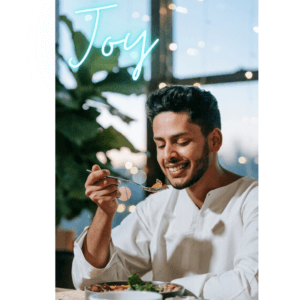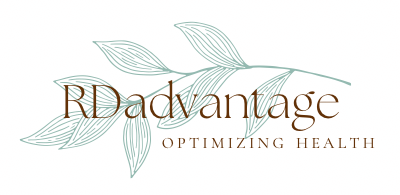How You Eat Matters

When I talk about optimizing your diet for longevity and to be healthy, I talk a lot about the quality and quantity of food and the timing of meals. To read my other blog about this, click on my Personalized Nutrition article. What I want to include here is HOW you eat.
Digestion is Affected by HOW You Eat
How you eat matters because this affects digestion and signals to your body and to your brain what is going on in your environment. If you are eating in a stressful state, then your brain receives this stress signal and tells your body to prioritize energy for you to RUN. What is not needed for you in an emergency state will not be prioritized which means that things like reproduction and digestion, hair growth & muscle growth slow down during this moment of “emergency”.

Eat calmly --> Digest well
When you eat in a calm state, you digest properly and that is important. Poor digestion can start a whole host of problems from decreased stomach acid, undigested proteins, increased intestinal permeability or “leaky gut” which may lead to food allergies or sensitivities, inflammation, gut issues and/or autoimmune disease.
Stress isn’t all bad. It is sometimes necessary for your body to respond to stress. The problem is that you should be more calm than stressed, but it seems like people are more stressed than calm. Your body is able to handle and respond to occasional short bursts of stress. After this acute stress, your body will go back to “normal” or homeostasis.
You get into trouble when the stress is chronic. A constant signaling that there is stress is not healthy and this also causes inflammation and this triggers your immune system to “be on the alert” all the time.
In a University of Minnesota paper,
it stated that eating in a stressed state diverts energy away from digestion and puts it “on hold”.
Distractions were included as part of eating in a stressed state.
What is stress and how stress affects digestion:
Stress can be real or perceived stress.
Here are some different types of stress:
Physical stress – this includes manual labor and suboptimal sleep.
Chemical stress – this includes drugs and alcohol, pollution, environmental toxins (such as pesticides)
Emotional stress – this includes worry, fear, anger, sadness
Nutritional stress – this includes food allergies and intolerances, micronutrient deficiencies or toxicities
Do you eat in a stressed out state,
rushing through your meals while multi tasking?

Stress eating may look like eating while working, eating on the go, eating while driving, eating while studying, or eating while checking your email. When this is happening, then you may feel symptoms of indigestion from constipation, diarrhea to abdominal discomfort or pain. What comes along with stress eating sometimes is “fast” eating where you are eating too quickly and not chewing thoroughly. This can also cause symptoms and results in poor digestion. People who eat this way often don’t enjoy their food or have a poor sense of what was just eaten.
It is not uncommon these days to have a busy work life where you’re always rushing and running out of time. This could also mean that you are not chewing well either. If you are stressed because of a deadline, because you are in a hurry, or you have emotional stress, then you likely are mindlessly eating, not fully enjoying your food and not chewing well and all this affects digestion.

Mindful Eating
Mind-Body Connection
It is important to eat mindfully in a calm state.
Mindful eating means you are present and aware of what you are eating. Have you ever eaten mindlessly where you asked yourself, “Where’s my yogurt. Did I eat it?”
Digestion actually begins with your mind. If you are preparing or cooking your meal, then you are using your senses to signal to your brain that food is about to be received. You are seeing, touching, smelling, tasting and hearing the sizzling of food as you’re cooking. Your brain tells your body to prepare for the food by increasing saliva and getting stomach acid ready. Eating in a calm state may look like sitting down for a meal without distractions, tasting and enjoying your meal alone or with good company. It is being mindful and present as you eat. Read more about digestion.

Eating mindfully also helps you have better eating habits and can support hunger and fullness cues. When you eat in a stressed state and eat in a rush, you tend to overeat and not feel satisfied.
One study showed how mindfulness improves digestion by normalizing peristalsis, increasing enzymes, gastric juice, and bile, improving nutrient absorption and assimilation, and by promoting “rest and digest” or parasympathetic nervous system dominance.
They go on to say that being in that “rest and digest” state when eating can improve motility. Eating in a stressful “fight or flight” state affects digestion by changing motility (rate of digestion so you may be more constipated or have diarrhea), decreasing blood flow to the GI tract leaving food in your GI tract poorly digested, impairing nutrient absorption, increasing inflammation, decreasing serotonin production, decreasing stomach acid, and impairing vagus nerve activity.
How to Eat in a Calm State
What are some things you can do to get to a calm state if you are busy at work with limited time?
Some people will get to a calm state also by sitting outside in nature, looking at nature or people watching out of a window at work, enjoying the company of co-workers with non-stressful conversations, praying before a meal, smelling your food, or having gratitude for your food before eating.
Don’t forget to chew to mechanically break down food. Your saliva has amylase, enzymes to breakdown carbohydrates. Chewing thoroughly also gives time for your brain to tell your body to digest properly.
Don’t eat in a rush.
Use all your senses to enjoy your food and appreciate the food you are about to eat.

Experience Joy!
There is one other component that I would like people to understand and that is joy.
Sometimes you can “intellectually” tell yourself to calm down. You can do the meditation and deep breathing – this is great. There are great research and studies that show that meditation and deep breathing will lower your heart rate and lower your blood pressure, but are you experiencing joy? You could be in a state of “non-stress”, but I would like for you to experience something daily that makes you enjoy the moment and you’re not even thinking “intellectually” about not being stressed.
Try creating art, painting, singing, listening to music, playing an instrument, reading a good book, hiking, etc…whatever it is that brings you happiness, that’s what I want you to have…daily joy.
Joy doesn’t have to be a big event. It could be something small but accessible, easy, and realistic. Think about the kids in the elementary classroom enjoying time playing and creating with their friends. Some things may not be realistic daily. For example, maybe skiing brings you so much joy and happiness – the snow, the cold, zig zagging hills, but skiing is a seasonal sport. You can still look forward to skiing but think of a joy you can have daily.
For me, I enjoy gardening and comedy. I also enjoy birds – they bring me joy, so I have a bird feeders & a hummingbird feeders. I get to see them everyday except in the winter. Not only do I not feel stressed when I am gardening, watching a comedy show or looking at the birds, but I am fully engaged and I feel peaceful and happy. What is something that can bring you joy daily?
If you want my help and guidance, please contact me.
It’s time for you to find out what is the best diet that is just right for you!
Start with your diet. I take a food first, science based approach to optimizing your health.
Food First. Food for nourishment. Food is hope. Food for health.
I’m looking forward to helping you get to your best self with personalized nutrition.
I can also make recommendations on some functional testing to see how you are absorbing and digesting your food. In addition, I can recommend testing to see if stress is affecting your gut microbiome, if you have a “leaky gut”, and if it’s affecting your health.
Start feeling good, looking good, and being better!
To schedule an appointment or for a free Discovery Call:
or call/text (818) 335-9457 for an appointment or with any questions.
For online booking, click here
I also accept insurance from Health Net and First Health.
I offer superbill upon request.
If you are scheduling an appointment through Healing Arts Collective on a sliding scale fee, please click here

Resources:
Cherpak CE. Mindful Eating: A Review Of How The Stress-Digestion-Mindfulness Triad May Modulate And Improve Gastrointestinal And Digestive Function. Integr Med (Encinitas). 2019 Aug;18(4):48-53. PMID: 32549835; PMCID: PMC7219460.
Nelson JB. Mindful Eating: The Art of Presence While You Eat. Diabetes Spectr. 2017 Aug;30(3):171-174. doi: 10.2337/ds17-0015. PMID: 28848310; PMCID: PMC5556586.
https://www.takingcharge.csh.umn.edu/mindfulness-helps-us-digest-and-enjoy-our-food
Aucoin M, Lalonde-Parsi MJ, Cooley K. Mindfulness-based therapies in the treatment of functional gastrointestinal disorders: a meta-analysis. Evid Based Complement Alternat Med. 2014;2014:140724. doi: 10.1155/2014/140724. Epub 2014 Sep 11. PMID: 25295066; PMCID: PMC4177184.
